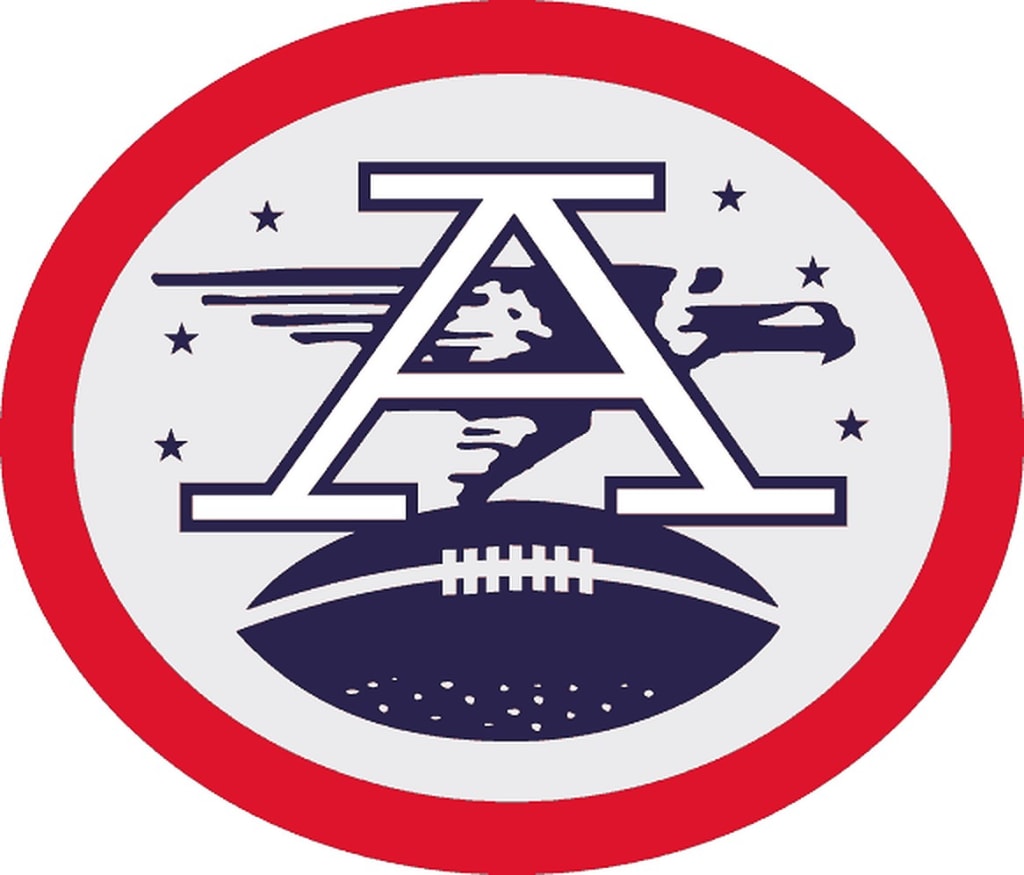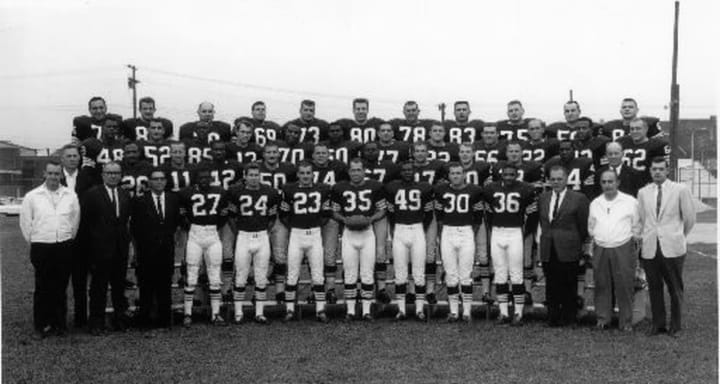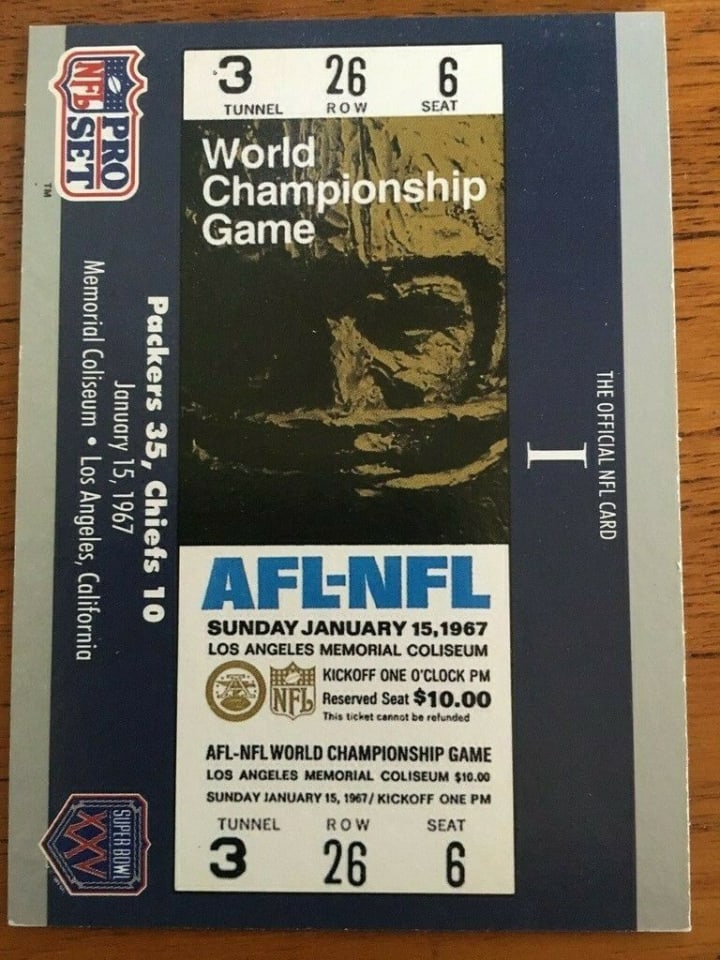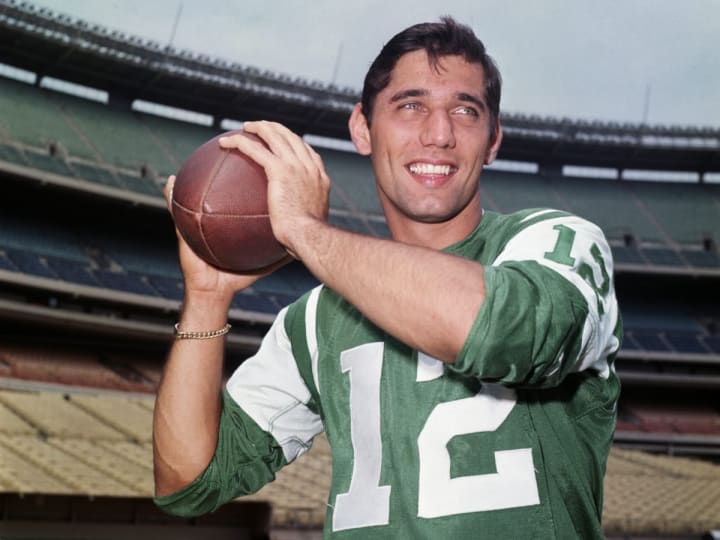History of the NFL Playoffs (Part II: The AFL and the Super Bowl - 1960s)
The 1960s saw a second pro football league debut, as well as the addition of a landmark game that would become its own holiday

For the first 40 seasons of the National Football League's existence, the league stood as the primary source of pro football, with the league's standings determining which team is crowned as the NFL Champions for the first 13 seasons (1920-1932). The 1932 season ended with a tie atop the league standings between the Chicago Bears and the Portsmouth Spartans, leading to the two teams facing each other in a playoff game for the NFL Championship. The success of that game led to the NFL Championship Game being instilled on the following year, and from that point, the game was played between winners of the East and West Divisions (later the Eastern and Western Conferences).
And then, a new decade began.
The 1960s is known as the decade where sports evolved and expanded across the continent, and the NFL was no exception. Many teams debuted during the 1960s, with 1960 seeing the debut of the Dallas Cowboys, serving as the NFL's 13th franchise, while #14 came a year later in the form of the Minnesota Vikings. However, it wasn't just new teams that debuted--a new league was added as well.
After failing to own an NFL team, Lamar Hunt started a league of his own to rival the four-decade-old NFL: the American Football League. The league debuted with eight teams in two separate divisions. The Eastern Division consisted of the Houston Oilers, the New York Titans (later the New York Jets), the Buffalo Bills, and the Boston Patriots. The West Division consisted of the Los Angeles Chargers, the Dallas Texans, the Oakland Raiders, and the Denver Broncos. The Texans would move to Kansas City after the 1962 season and become the Chiefs. The AFL's playoff format was the same as the NFL's: the two division winners played in the AFL Championship Game. The league's first two games would feature the same teams--the Oilers and the Chargers, with the Oilers winning both times. Meanwhile, the 1960 NFL Championship Game saw the Philadelphia Eagles defeat the Green Bay Packers, 17-13, handing the legendary Vince Lombardi his only playoff defeat in his career.
1962's AFL Championship Game between the Texans and Oilers made history; not only was it the only one of the 10 games to reach overtime, it was one of a very, very small number of double overtime games. Overtime didn't exist in pro football yet, and even when it was added over a decade later, only one period was played during regular season games, meaning that the only way we could see double overtime games is in the playoffs. Even then, with the rules at the time and how long a period is, it makes the chances of a game needing more than one OT period very miniscule. However, thanks to the Texans blowing a 17-0 halftime lead by giving up 17 unanswered points, overtime commenced, and then a second period occurred after no scoring in the first. The Texans won with a chip-shot field goal just 2:54 into the second OT, sealing a 20-17 victory.

I have to mention 1964. That season saw the Cleveland Browns finish with a 10-3-1 record, which was enough for them capture the Eastern Conference by a half game over the St. Louis Cardinals. Their opponents in that year's NFL Championship Game: the Baltimore Colts, who ran away with the Western Conference that season. On December 27, 1964, the Browns blanked the Colts, 27-0, at Cleveland Municipal Stadium to capture their fourth NFL Championship--as well as their last. In fact, this was the last pro sports championship won by the city of Cleveland until the NBA's Cleveland Cavaliers won the NBA Championship in 2016.
The Browns made it back to the NFL Championship Game on the following year, as they finished 11-3 and won the Eastern Conference by four games. In the West, the Green Bay Packers and the Baltimore Colts finished with identical 10-3-1 records and had to play a playoff game, the league's last in history. The Packers won, 13-10, in overtime over the Colts, and went on to defeat the Browns to capture the NFL Championship. That same year, the AFL's Championship Game was contested between the Buffalo Bills and the San Diego Chargers, with the Bills blanking the Bolts 23-0.

Shortly before the 1966 season began, the leagues were working on merging. That's right; the famous merger that happened was actually four years in the making. Expansion continued that year, as the Miami Dolphins debuted in the AFL, while the NFL would see the Atlanta Falcons join the league. The main result would of this deal would come four years later, but one of the earliest parts of this merger included the creation of a World Championship Game, which would pit the AFL Champions against the NFL Champions. Of course, we currently know this game as the Super Bowl, but that familiar name wouldn't come into fruition yet.
The playoff formats for both leagues remained the same, and in the AFL, the East Champion Buffalo Bills faced off against the West Champion Kansas City Chiefs, with the Chiefs blasting the Bills, 31-7. In the NFL, the West Champion Green Bay Packers defeated the East Champion Dallas Cowboys, 34-27, and thus, the matchup for the First AFL-NFL World Championship Game, aka Super Bowl I, was set. The league championship games took place on New Year's Day 1967, followed by the inaugural Super Bowl two weeks later on January 15, 1967. The big game actually aired on NBC and CBS on that evening, and at the event in Los Angeles, the Packers defeated the Chiefs, 35-10, which was followed by Packers QB Bart Starr being named as the first-ever Super Bowl MVP.
While the AFL retained their format in 1967, the NFL had to realign their conferences due to the addition of the New Orleans Saints that year. With 16 teams in the NFL, the league split its conferences into two four-team divisions; the Eastern Conference had the Capitol (Cowboys, Eagles, Washington, Saints) and Century (Browns, Giants, Cardinals, Steelers) Divisions, while the Western Conference had the Coastal (Rams, Colts, Falcons, 49ers) and Central (Packers, Vikings, Bears, Lions) divisions. Regarding the playoffs, the conference's division winners would face each other in the Conference Championship, with the winners facing each other in the NFL Championship Game. This was the exact format that Major League Baseball would use two years later.
In the East, the Cowboys and Browns emerged as the winners of the Capitol and Century Divisions, respectively, while the Rams won the Coastal via tiebreaker, and the Packers won the Central. The Cowboys blasted the Browns in the Eastern Conference Championship, 52-14, while the Packers did the same to the Browns in the Western Conference Championship, 28-7. As a result, the two teams faced each other for the second straight year in the NFL Championship Game, though this meeting was the famous "Ice Bowl" played in deep subzero weather at Lambeau Field. The Packers won, 21-17, on New Year's Eve 1967, the same day that the Oakland Raiders blew out the Houston Oilers, 40-7, in the AFL Championship Game. On January 14, 1968, the Packers defeated the Raiders, 33-14, in the Second AFL-NFL World Championship Game, aka Super Bowl II.
In 1968, the Saints and Giants swapped divisions, while the AFL welcomed a 10th franchise: the Cincinnati Bengals. The Eastern Conference Championship was a rematch of the previous year, but this time, the Browns defeated the Cowboys, while the Colts defeated the Vikings in the Western Conference Championship. The high-powered Colts blasted the Browns, 34-0 in the NFL Championship Game.
As for the AFL...

This man, who is still too cool for school, is Joseph William Namath, undoubtedly the greatest QB in the history of the New York Jets. The Jets dominated the Eastern Division with an 11-3 record, while the AFL's Western Division needed a playoff game between the Chiefs and Raiders, who finished with identical 12-2 records. The Raiders won the playoff, 41-6, and went on to face the Jets, who shocked the league with a 27-23 win in that year's AFL Championship Game. The Jets and Colts faced each other in Super Bowl III (the Third AFL-NFL World Championship Game), and as every historian knows, the Colts were the heavy favorites--14 point favorites to be exact. Also, there wasn't a lot of respect directed towards the AFL, which was known as a league mainly focused on offense, a sharp contrast to the defense-minded NFL. None of that deterred Namath, who--in response to a rowdy Colts fan, said these famous words:
"We're going to win this game, I guarantee it."
He was half in the bag when he said it, but he still ended up being right. The Jets defeated the Colts (who had to start Earl Morrall for the injured Johnny Unitas), 16-7, standing as the biggest upset in Super Bowl history for over three decades. The Jets' win forced doubters to put some respect on the AFL's name, as they defeated a team who was supposed to blow them out of the building.
1969 was the AFL's final year, and that was the year that they made some adjustments to their playoff format. For that year, the AFL instilled a four-team tournament, with the second place teams in each division qualifying. The Divisional Playoff would pit the second place team in one division against the first place team in the other one, and for 1969, it was the Chiefs ousting the defending champion Jets, 16-7, in one game, while the other saw the Raiders beat down the Oilers, 56-7. In the final AFL Championship Game, the Chiefs defeated the Raiders, 17-7, to reach the Super Bowl for the second time in franchise history. While 1969 was a farewell for the AFL, it was a milestone for the NFL; it was their 50th season. The Cowboys and the Browns met in the Eastern Conference Championship for the third straight year, with the Browns winning, 38-14. In the Western Conference Championship, the Minnesota Vikings defeated the Los Angeles Rams, 23-20, and went on to defeat the Browns, 27-7, to win their first NFL Championship.
On January 11, 1970, the Chiefs defeated the Vikings, 23-7, to win Super Bowl IV (the Fourth AFL-NFL World Championship Game). Fitting, isn't it? Lamar Hunt, the man who built up the AFL a decade prior, emerges as a Super Bowl Champion owner in his league's final season. The AFL would merge with the NFL during the 1970 offseason, and it would serve as the earliest stage of the league we are all familiar with, which would include a different path to what would be immortalized as the Super Bowl.
If you like this story, click the heart and the subscribe button, and feel free to comment below! Tips and pledges would be greatly appreciated, but only if you want to do so!
About the Creator
Enjoyed the story? Support the Creator.
Subscribe for free to receive all their stories in your feed. You could also pledge your support or give them a one-off tip, letting them know you appreciate their work.






Comments
There are no comments for this story
Be the first to respond and start the conversation.